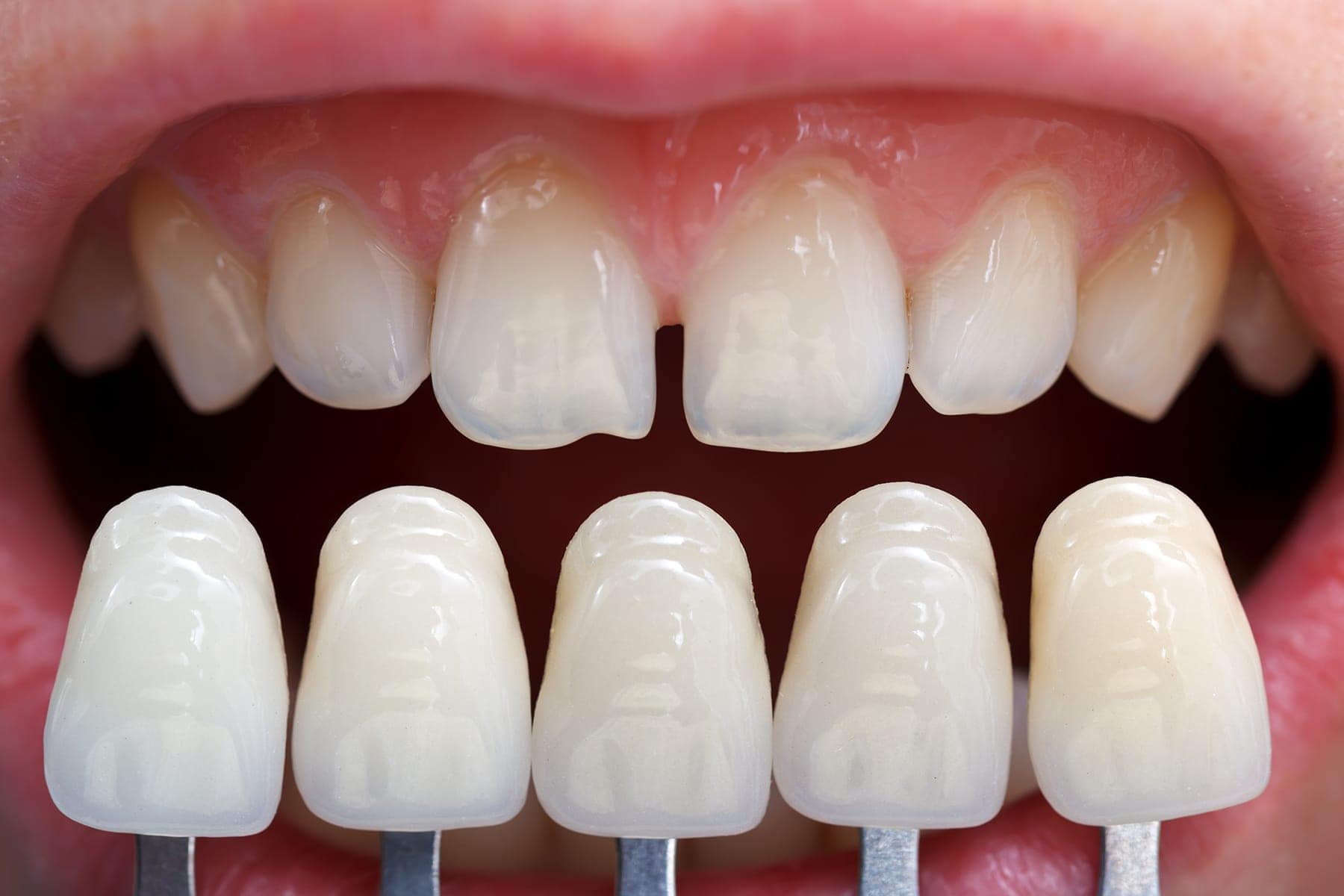What are Dental Veneers And How Do They Work?

Dental veneers are thin porcelain shells that are bonded to the front of teeth to improve their appearance by changing their shape, color, or size. They work by covering imperfections and create a natural-looking smile.
Dental veneers are a popular cosmetic dental procedure that helps to enhance the appearance of teeth.
Understanding Dental Veneers
What are dental veneers?
Dental veneers are thin, custom-made shells made from tooth-colored materials that are designed to cover the front surface of teeth. They are a popular cosmetic dentistry solution to improve the appearance of teeth that are discolored, chipped, misaligned, or worn down. Veneers are bonded to the front of the teeth, effectively transforming their shape, size, color, and overall appearance.
How do dental veneers work?
Veneers work by carefully reshaping the affected teeth and creating a custom-designed mold. This mold is then used to create the veneers, which are permanently placed on the teeth using dental cement. The process typically requires two visits: one to prepare the teeth and take impressions, and another to bond the veneers onto the teeth. Once in place, veneers can provide a long-lasting and natural-looking solution to enhance your smile.
Different types of dental veneers
There are two main types of dental veneers: porcelain veneers and composite veneers. Porcelain veneers are often preferred for their durability, stain resistance, and ability to mimic the light-reflecting properties of natural teeth. On the other hand, composite veneers are more affordable and can be directly applied to the teeth during a single visit. Your dentist can help you determine the most suitable option based on your specific dental needs and budget.

Credit: signaturedentistry.com.au
Benefits Of Dental Veneers
Dental veneers are a versatile solution for achieving a whiter smile, correcting crooked or misaligned teeth, covering chips, cracks, and gaps, as well as reshaping and resizing teeth. Veneers are like thin shells that are custom-made to fit over the front surface of your teeth, enhancing their appearance and functionality. With veneers, you can dramatically improve the color and shape of your teeth, creating a more harmonious and symmetrical smile.
One of the key benefits of dental veneers is the ability to achieve a whiter smile. Veneers can cover up deep stains and discoloration that are resistant to conventional teeth whitening methods. This makes them an ideal choice for individuals who are looking to achieve a brighter and more youthful smile.
In addition to enhancing the color of your teeth, veneers can also correct crooked or misaligned teeth. They can be used to slightly adjust the position of your teeth, resulting in a straighter and more aligned smile. This makes veneers an excellent alternative to orthodontic treatment for individuals with minor alignment issues.
Veneers are also effective in covering chips, cracks, and gaps in your teeth. They can restore the natural shape and structure of damaged teeth, providing a seamless and uniform appearance. By concealing any imperfections, veneers can give you a confident and flawless smile.
Another advantage of dental veneers is their ability to reshape and resize your teeth. If you have uneven or misshapen teeth, veneers can be used to create a more balanced and proportionate smile. They can be tailored to your desired specifications, ensuring that your teeth look harmonious and in line with your facial features.
The Procedure Of Getting Dental Veneers
htmlDental veneers are a popular cosmetic dentistry treatment that can help improve the appearance of your smile. The process of getting dental veneers generally involves the following steps:
1. Consultation with a dentist: Before undergoing the dental veneers procedure, you will first need to schedule a consultation with a qualified dentist. During this initial appointment, you can discuss your expectations and concerns regarding the treatment, and the dentist will evaluate whether veneers are suitable for you.
2. Teeth preparation process: Once you decide to proceed with dental veneers, your dentist will prepare your teeth for the procedure. This typically involves removing a small amount of enamel from the front surface of your teeth to create space for the veneers.
3. Temporary veneers (if applicable): In some cases, your dentist may provide you with temporary veneers while your permanent ones are being crafted. These temporary veneers protect your prepared teeth and give you an idea of how your final result may look.
4. Permanent veneers placement: Finally, your custom-made permanent veneers will be bonded to your teeth using a special adhesive. The dentist will ensure a proper fit and make any necessary adjustments. With the veneers in place, you can enjoy a transformed smile that looks natural and aesthetically pleasing.
Caring For Dental Veneers
Proper oral hygiene routine: Maintaining a good oral hygiene routine is crucial for the longevity and appearance of dental veneers. This includes brushing your teeth twice a day with a soft-bristled toothbrush and fluoride toothpaste. It’s important to gently brush around the edges of the veneers to remove any plaque or bacteria.
Avoiding certain foods and habits: To prevent staining and damage, it’s wise to avoid consuming foods and beverages that are highly pigmented or acidic. Examples include coffee, tea, red wine, and citrus fruits. Additionally, chewing on hard objects like ice cubes, pens, or fingernails should be avoided to prevent chipping or cracking the veneers.
Regular dental check-ups: Schedule regular dental check-ups with your dentist to monitor the condition of your dental veneers. These visits allow professional cleaning and inspection to identify any issues early on.
Potential Risks And Considerations Of Dental Veneers
| Potential Risks and Considerations of Dental Veneers |
| Sensitivity and discomfort |
| Dental veneers are a popular cosmetic dentistry option that can transform your smile. However, it’s important to be aware of potential risks and considerations before opting for this procedure. |
| One potential concern is sensitivity and discomfort. After the veneers are placed on your teeth, you may experience increased sensitivity to hot or cold temperatures. This sensitivity usually subsides after a few days or weeks, but it’s important to discuss this possibility with your dentist. |
| Another consideration is that dental veneers are an irreversible procedure. Once your teeth are prepared and the veneers are bonded, there’s no going back. You should carefully consider this permanent change and ensure it aligns with your long-term dental goals. |
| Cost and insurance coverage are also important factors to consider. Dental veneers can be costly, and their aesthetic nature often means they aren’t covered by insurance. It’s essential to discuss the financial implications with your dentist and explore payment options. |
Is Dental Veneers Treatment Right For You?
Who is a good candidate for dental veneers?
Dental veneers are a popular cosmetic dentistry treatment, but they may not be suitable for everyone. Generally, a good candidate for dental veneers is someone who has discolored, chipped, or misshapen teeth. Veneers can also help with gaps or spaces between teeth. However, individuals with severe tooth decay, gum disease, or weakened teeth may need to address these issues before considering veneers. It is essential to consult with your dentist to determine if veneers are the right option for you. Your dentist will evaluate your oral health and discuss alternatives to dental veneers if necessary.
Alternatives to dental veneers
For individuals who are not good candidates for dental veneers or wish to explore alternative options, there are alternatives available. These may include teeth whitening for discolored teeth, dental bonding for minor chips or cracks, orthodontic treatments for spacing issues, or even dental implants for missing teeth. Consulting with your dentist is crucial to determine the most suitable treatment plan for your specific dental needs.
Frequently Asked Questions On What Are Dental Veneers And How Do They Work?
How Long Do Dental Veneers Last?
Dental veneers typically last about 10 to 15 years with proper care and maintenance.
How Much Does Veneers Cost?
Veneers cost varies, but generally range from $500 to $3,000 per tooth. The final price depends on factors like location, dentist expertise, materials used, and the number of teeth treated. It’s always best to consult with a dental professional for an accurate cost estimate for your specific case.
What Happens To Teeth Under Veneers?
Under veneers, teeth are not affected as the process involves covering the front surface with a thin shell. It’s a cosmetic procedure that can improve the appearance of stained, misaligned, or damaged teeth. Veneers provide a natural-looking and durable solution to enhance your smile.
Is Getting A Veneers Painful?
Getting veneers is generally not painful, as the procedure is performed under local anesthesia. Some patients may experience mild sensitivity or discomfort afterward, but it typically subsides within a few days.
Conclusion
Dental veneers are a popular cosmetic dental treatment that can transform your smile. By covering the front surface of your teeth, veneers can greatly improve the appearance of stains, chips, or gaps. With advancements in technology, veneers are now more natural-looking and durable than ever before.
If you’re unhappy with your smile, dental veneers may offer the solution you’ve been searching for. Talk to your dentist to find out if veneers are right for you and take the first step towards your dream smile.





